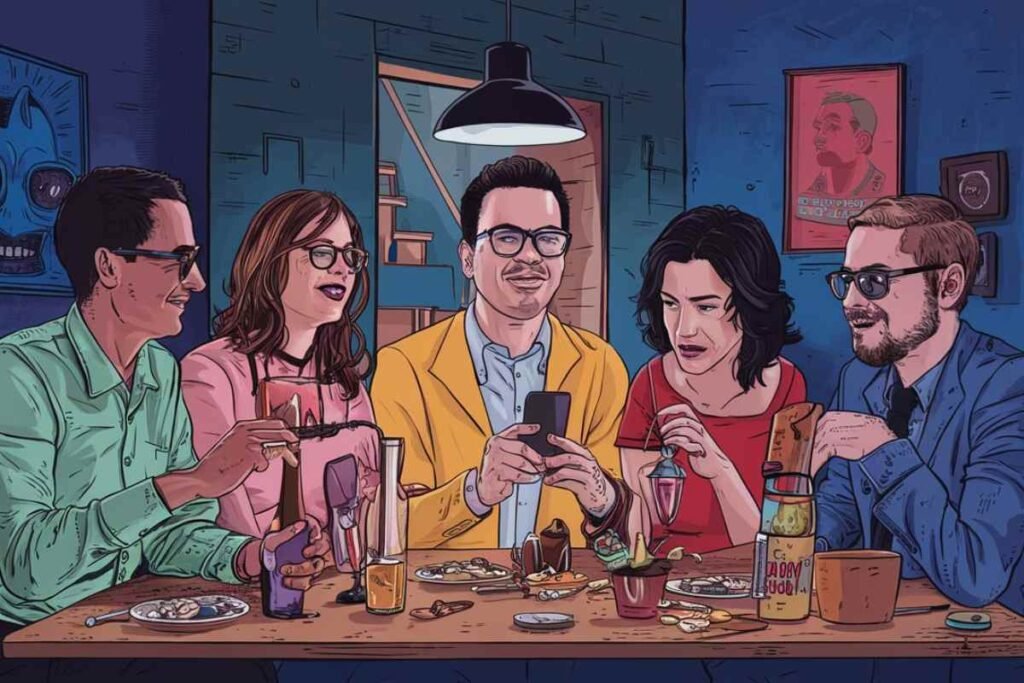Table of Contents
In the vast, ever-evolving landscape of internet culture, new trends and memes continually emerge, capturing the attention and participation of online communities.
One such trend that has sparked both curiosity and controversy is the Coomer Party. This term, originating from internet meme culture, has grown into a multifaceted phenomenon, involving humor, social commentary, and digital community building.
This article delves deeply into the concept of the Coomer Party, exploring its origins, cultural significance & controversies.
Understanding the Term Coomer Party

Origins and Evolution
The term Coomer is derived from a meme featuring a caricature of a Wojak cartoon character. This character, often depicted with exaggerated physical features such as unkempt hair and dark circles under the eyes, symbolizes an individual excessively indulging in activities related to sexual gratification, particularly through the consumption of online pornography.
The Coomer meme emerged as a form of satire, critiquing the perceived overconsumption of adult content and the lifestyle associated with it.
The Birth of Coomer Party
Building on the Coomer meme, the concept of a Coomer Party evolved. While it is not an actual party in the traditional sense, it represents a gathering often virtual where individuals engage in activities or discussions centered around adult content.
This term has been used humorously to describe online forums, threads, or virtual meetups where the primary focus is on sexual content and related topics.
The Cultural Context of Coomer Parties
Digital Subcultures and Meme Culture
To understand the Coomer Party, it is essential to recognize the broader context of digital subcultures and meme culture.
Memes are a powerful form of communication on the internet, conveying complex ideas through simple, often humorous imagery and text.
They can create and shape subcultures, providing a sense of identity and community among participants.
The Coomer meme and its evolution into the Coomer Party are prime examples of how memes can reflect and critique societal behaviors.
These memes serve as a commentary on the consumption of pornography and the lifestyle it represents, blending humor with criticism.
The Role of Anonymity and Online Communities
Online anonymity plays a significant role in the proliferation of Coomer Parties. Platforms like Reddit, 4chan, and various social media sites allow users to engage in discussions without revealing their identities.
This anonymity can encourage more candid conversations about taboo topics, including pornography consumption.
Communities built around shared interests in memes and adult content create spaces where individuals can connect and share experiences.
For many, these communities offer a sense of belonging and understanding that they may not find in their offline lives.
The Allure of Coomer Parties

A Space for Open Dialogue
One of the primary attractions of Coomer Parties is the opportunity for open dialogue about topics often considered taboo.
Participants can discuss their experiences, preferences, and challenges related to adult content consumption without fear of judgment.
This openness can lead to a sense of camaraderie and mutual support among participants.
Humor and Satire
Humor is a central element of Coomer Parties. The satirical nature of the Coomer meme allows participants to laugh at themselves and the absurdity of their behaviors.
This self-deprecating humor can be a coping mechanism, helping individuals deal with feelings of guilt or shame associated with their consumption habits.
Exploration of Identity and Sexuality
For some participants, Coomer Parties provide a platform to explore their identities and sexualities. The anonymity and acceptance within these communities can encourage individuals to experiment with new forms of expression and understand their desires better.
The Controversy Surrounding Coomer Parties
Ethical and Moral Concerns
Coomer Parties are not without their critics. Ethical and moral concerns are often raised regarding the promotion of excessive consumption of adult content.
Critics argue that these gatherings can normalize and even encourage addictive behaviors, potentially leading to negative mental health outcomes.
Issues of Consent and Boundaries
Another significant concern is the potential for blurred boundaries and consent issues within Coomer Parties.
The free-flowing nature of discussions and activities, often involving explicit content, can lead to situations where participants might feel uncomfortable or pressured.
Ensuring clear consent and respectful interactions is crucial to addressing these concerns.
Impact on Relationships and Social Interactions
The excessive consumption of pornography and participation in Coomer Parties can have detrimental effects on personal relationships and social interactions.
Critics argue that it can lead to unrealistic expectations and dissatisfaction in real-life relationships, as well as social isolation.
The Rise of Virtual Coomer Parties During the Pandemic
Adapting to Social Distancing
The COVID-19 pandemic significantly impacted social interactions, leading to an increase in virtual gatherings.
Coomer Parties adapted to this shift, with more participants joining virtual platforms to connect and engage in discussions.
This transition showcased the adaptability of online subcultures and the enduring appeal of digital communities.
The Benefits and Drawbacks of Virtual Gatherings
Virtual Coomer Parties offered several benefits during the pandemic. They provided a sense of connection and social interaction at a time when in-person gatherings were limited.
However, the virtual format also brought challenges, such as ensuring participants’ privacy and managing the spread of explicit content responsibly.
Who Should Avoid Using the Term “Coomer Party”?

Minors and Inappropriate Content
Given the explicit nature of the term and its associations with adult content, it is advisable for minors to avoid using or engaging in discussions labeled as Coomer Parties.
Exposure to explicit material can have legal and ethical implications, and it is crucial to protect younger audiences from inappropriate content.
Professional and Public Settings
Using the term “Coomer Party” in professional or public settings is generally inappropriate. Discussing topics related to pornography can be offensive or discomforting to others and may not align with workplace conduct policies.
It is important to be mindful of context and audience when discussing sensitive topics.
Conclusion
The concept of the Coomer Party epitomizes the intersection of digital subcultures, meme culture, and contemporary societal issues.
While it provides a unique space for humor, open dialogue, and identity exploration within certain online communities, it also raises significant ethical and moral questions, particularly regarding the normalization of excessive adult content consumption and its impact on personal relationships.
As internet culture continues to evolve, the future of Coomer Parties will likely depend on finding a balance between fostering open, respectful discussions and addressing the potential negative consequences of these gatherings.
Understanding and navigating these dynamics is crucial for both participants and observers of this digital phenomenon.
FAQs
What is a Coomer Party?
A Coomer Party refers to virtual gatherings or online discussions centered around adult content, often humorously or satirically critiquing the excessive consumption of pornography.
Where did the term “Coomer” originate?
The term “Coomer” comes from a meme featuring a caricature of a Wojak cartoon character, representing individuals overly indulging in sexual gratification, particularly through online pornography.
Are Coomer Parties real parties?
No, Coomer Parties are not traditional parties. They are typically virtual meetups or online forums where participants discuss or share content related to adult material.
Why are Coomer Parties controversial?
Coomer Parties are controversial due to ethical and moral concerns about promoting excessive pornography consumption, potential consent issues, and the impact on personal relationships and mental health.
How did the pandemic affect Coomer Parties?
The COVID-19 pandemic led to an increase in virtual Coomer Parties as people sought social interaction online. This shift highlighted the adaptability and enduring appeal of digital communities.
Who should avoid using the term “Coomer Party”?
Minors and individuals in professional or public settings should avoid using the term due to its explicit content and potential to offend or discomfort others.
What role does humor play in Coomer Parties?
Humor, particularly self-deprecating humor, is central to Coomer Parties. It helps participants cope with feelings of guilt or shame associated with their consumption habits and fosters a sense of community.


